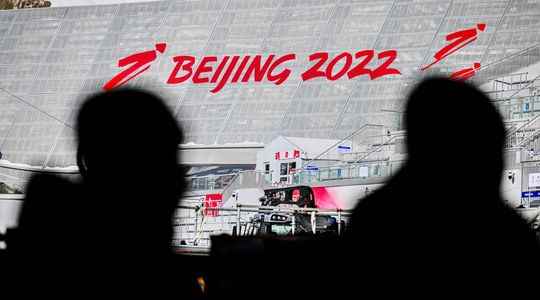The discussions preceding the opening of the Olympic Games generally revolve around the chances of medals for the very many delegations involved. Those concerning the Beijing Winter Olympics, which officially begin on Friday, started on very different bases. Between the Covid-19 health crisis, forcing local authorities to drastic checks on athletes, the very strong current geopolitical tensions (United States – China, India-China, Russia-Ukraine conflict), and domestic scandals (treatment of Uyghurs, Peng Shuai affair…), the sporting aspect is more than ever relegated to the background.
The opening ceremony scheduled for Friday should reinforce this impression. The notable absence of the United States, which has chosen to diplomatically boycott the event, will occupy the attention of many observers (and this is even the stated objective). The United Kingdom, Canada, Australia or even Japan will not send any official either. France, despite calls to follow the movement until the last minute, will include Sports Minister Roxana Maracineanu. Nothing compares to the ceremony of the 2008 Summer Olympics – certainly often considered more prestigious – in Beijing, during which Nicolas Sarkozy, for France, and the former American President George W. Bush rubbed shoulders.
Who will be left then? Among the distinguished guests, the Russian Vladimir Putin, the Egyptian Al-Sissi or the Saudi Mohamed Ben Salman (MBS) should normally be present, alongside the leader Xi Jinping, Mao’s new equal in China.
A Jinping-Putin strategic meeting
Not everyone will have the same interests there. For Vladimir Putin, the trip to Beijing will be an opportunity to strengthen his relations with Xi Jinping during a meeting. The Kremlin on Wednesday claimed China’s support for its demands on the West, and in late January Chinese Foreign Minister Wang Yi backed Moscow’s “reasonable concerns” -with respect to Ukraine. The two leaders also plan to set out their “common vision” on international security and sign a major gas deal.
The presence of Egypt, with Al-Sissi, has more to do with the close relations between the two countries from an economic point of view (thanks to the Suez Canal), but also geopolitics, for many many years. The idyll even reached the level of “global strategic partnership” in 2014, the highest in the hierarchy of the network of partnerships established by Chinese diplomacy, as noted by the researcher at the National Institute of Oriental Languages and Civilizations Emmanuel Véron and the historian specializing in China Emmanuel Lincot, in an article published on the site The Conversation.
The arrival of the Saudi leader, Mohamed Ben Salmane, is part of a more recent strategy by China with regard to the Gulf countries. “Its approach is above all economic, it invests and never seeks confrontation with the powers of the region. The most striking example of this is Saudi Arabia, of which China has become the first trading partner thanks to its imports of oil and the major role played by Chinese companies in Saudi infrastructure,” Jon Alterman, of the Center for Strategic and International Studies (CSIS), told L’Express earlier this year.
It should be noted, in this context, that the Emir of Qatar, Sheikh Tamim bin Hamad al-Thani, as well as the Crown Prince of Abu Dhabi Mohammed bin Zayed, will both attend the opening ceremony.
Two “blocks”
The Communist Party released a list of some 30 invited heads of state and leaders last week. All more or less close friends of China, or of the above-named autocrats, ranging from the presidents of Kazakhstan, Kyrgyzstan to that of Poland, Ecuador, to the king of Cambodia Norodom Sihamoni. Symbol of the existence of two “blocks”, within these Games, the officials chosen by Germany or even France – who therefore refused a boycott – do not however appear in the listing.
The traditional oils of international organizations, the president of the International Olympic Committee Thomas Bach, the secretary general of the UN Antonio Guterres or the director general of the World Health Organization (WHO), Tedros Adhanom Ghebreyesus, will be there. According to the IOC, Thomas Bach should even meet during these Games the Chinese tennis player Peng Shuai, who claimed in early November that a former Chinese leader had forced him to have sex during a romantic relationship that lasted several years.
Since then, China has skilfully staged his “return”, punctuated by “reassuring” statements about his state of physical and moral health. And this, thanks to the help of Thomas Bach, who had spoken by videoconference with the player. An attitude denounced in the sports world, and in particular by the WTA, the professional circuit governing the tournaments of professional tennis players, which is still not convinced of the freedom of movement of Peng Shuai. He is far from alone.
